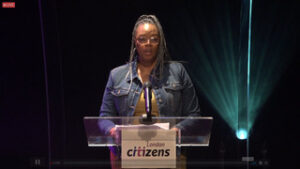“Having what felt like a personal relationship with a university gave me more confidence to inspire and support my children.”
Beverley Wong, one of the founding members of Parent Power in South London, tells us how the group has affected her and her children’s lives.
I am a mother of two children who started a relationship with King’s College London back in 2017. My daughters were around 13 and 15: one pre-GCSE options and one about to sit her GCSE exams. I attended a parent meeting at King’s College London, now infamously known as Parent Power (we gave it that name after our first wins: Cambridge and Oxford university trips, Summer School and a citizenship campaign to name a few early actions).
We were 40-plus parents, from varied multicultural experiences and languages, in a room sharing our hopes, fears and anger and especially things we were unaware of. Unlike the pitchfork scenes that might pop up into your heads at the thought of angry parents, we were being taken through a CitizensUK listening exercise that validated our strong emotions/concerns, asking what did we want to do about the issues raised? Mixed within these emotions were some general issues of feeling invisible, unheard, powerless, but most of all uninformed. We felt schools & universities seem to leave parents out of the equation and relied heavily on everything being on their websites; but not everyone can read between the lines.
We were local parents concerned about university finance, affordable Summer School activities and access to graduates who looked like or shared similar experiences to our children. If we were to inspire, what did the inside of so called ‘gold star’ universities look like from the inside? What was the real impact of citizenship for British-born children without British citizenship who tried to enter this arena, and what was the impact of the debt cycle caused by this for parents on low incomes? Parents in that space wanted real interaction with universities to the questions raised. We wanted focused discussions that created impactful changes.
Like most parents, I wanted my children to flourish and get a degree, but what was the right degree? Was putting my child in debt really the only option and how does this finance thing work out in reality? Who could my children speak to about their experiences at university? What did I need to take into consideration when they were choosing their GCSE options? What was involved in choosing a degree and what should we be looking for? How did the admissions look at my child? What financial assistances might be available? How could I support my child with the experiences needed to help prepare them for their lives at university or even that personal statement? What alternative options were there? Who could I speak to for advice?
The biggest lesson I learnt from this engagement experience is that universities that take the time to do parental engagement work create powerful ambassadors. Parents sharing knowledge and challenging for change impacts children, communities, and society.
My eldest has recently graduated with a first-class degree and is now working as an Alumni Programme Officer. My youngest, the indecisive teen who came along to a Parent Power action to the University of Oxford in 2017/18 and who told a reporter she didn’t want to go to university, will be starting her degree at the University of Bristol this September.
The Parent Power group helped to show me I was not alone, that acting together can create power and change for all.